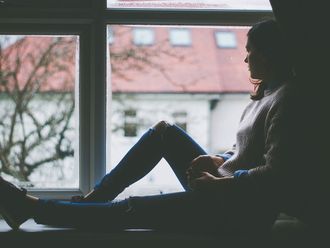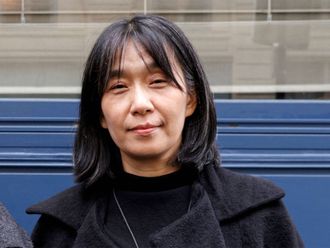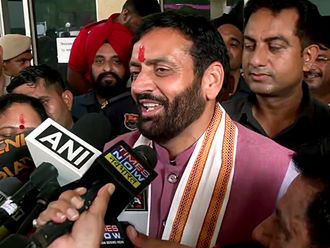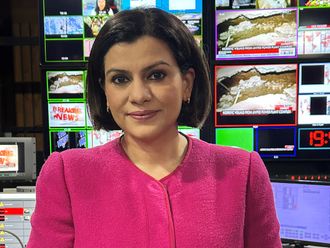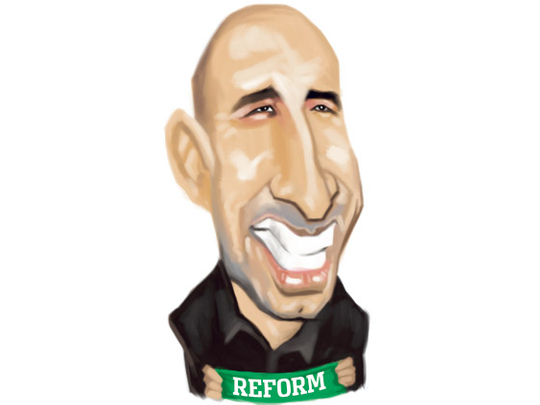
It looked, for a while, just like the bad old days: a handful of angry demonstrators on one side of a London street, shouting and waving placards as a larger group of men on the other pavement lobbed back Arabic insults over the heads of the watching policemen. But the past was swiftly banished when Muammar Gaddafi's son, Saif Al Islam Al Gaddafi, began to speak from the podium in a university lecture hall packed with businessmen, diplomats and students.
Saif, 37, is the face of a modern, reforming Libya, emerging from its past to become a dazzling centre for western investment, with a reinvigorated energy industry, billions of dollars in cash reserves, a re-opened US Embassy and even plans for mass tourism.
Gaddafi junior has no formal position in the Jamihiriya, the "state of the masses", but he is an energetic champion of change who has a finger in most pies in Libya, as well as jet-setting friends such as Britain's Lord Mandelson. It is widely assumed that he will one day succeed his father, although he insists he is a democrat for whom dynastic rule ended with the 1969 revolution.
Saif got all the difficult old issues out of the way at the start of his speech at the London School of Economics (LSE) last week; a rare public appearance. He surveyed Libya's decision to dismantle its programme to develop nuclear and chemical weapons, the lifting of UN sanctions, the settlement of claims relating to the Lockerbie bombing and the end of a long row with Bulgaria over medics who were jailed for allegedly infecting children with the Aids virus.
A predictable question about Abdul Basset Al Megrahi, the terminally ill Lockerbie bomber who was freed from his Scottish prison and allowed to go home to die last summer, produced a response so terse it was almost non-existent: Saif is evidently well-advised by his New York PR company. The trick is to focus on the country's new-found respectability and its future prospects.
"For young Libyans, particularly, this shift has seemed like a dream come true, a dramatic change and a very welcome one," he beamed. "In this new phase, we began to look to find our own way, to develop our economy and reform our political system and furthermore to adapt to a globalised, interdependent world."
Libya's colonial legacy, the curse of an oil economy and the lack of a tradition of civil society were all serious obstacles to be overcome. In theory, Libya was "the most democratic state in the world" because of its idiosyncratic system of "peoples' congresses". In practice, he added, pausing for knowing laughter, "the reality has fallen far short of the ideal".
Saif was awarded a doctorate at LSE and the powerful charitable foundation he heads gave its Centre for Global Governance a grant of £1.5 million (Dh7.95 million) last year. His former professor looked on approvingly as he set out his vision for moving "from a socialist state to a social liberal state and from a rentier state to a capability-building state".
Achievements so far included poverty alleviation through Libyan Economic and Social Development Fund as well as compensation for Libyans whose property was confiscated by the state in the austere and revolutionary 1980s. Now, with the economy booming, there are family savings accounts for all citizens, flat taxes to encourage entrepreneurship and other business-friendly policies.
Another key reform he pioneered was a reconciliation that culminated in the release of hundreds of former terrorists and even the leaders of the Al Qaida-linked Libyan Islamic Fighting Group pursued in the face of stubborn opposition from the old guard who still run the security services. His brother Muatasim, a far less liberal figure, is the leader's national security adviser as well as a potential rival.
Saif boasted, too, of an end to human rights violations: he recently hosted the first-ever press conference held by Human Rights Watch in Tripoli, but it and other watchdogs point to continuing abuses of Libyans and African migrants and unresolved cases such as that of Jaballah Mattar, one of Gaddafi senior's most outspoken critics when he was arrested and jailed 20 years ago. Freedom of expression has improved with a couple of privately owned newspapers and radio stations; freedom of association has not.
It is clearly hard for him to escape that giant shadow. "Muammar Al Gaddafi is not just my father," said Saif. "He is the father of the nation. We cannot do anything without his approval. He is not against reforms he has been very supportive. Without his support nothing will happen."
Ian Black is the Guardian's Middle East editor.



